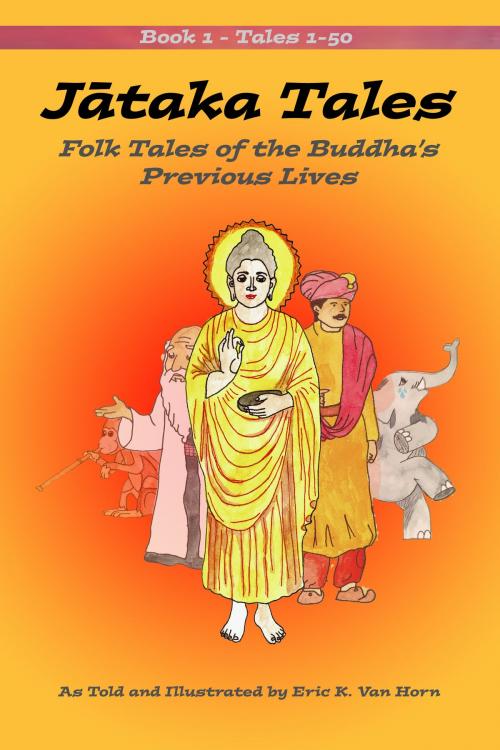| Author: | Eric Van Horn | ISBN: | 9780463850619 |
| Publisher: | Eric Van Horn | Publication: | May 13, 2018 |
| Imprint: | Smashwords Edition | Language: | English |
| Author: | Eric Van Horn |
| ISBN: | 9780463850619 |
| Publisher: | Eric Van Horn |
| Publication: | May 13, 2018 |
| Imprint: | Smashwords Edition |
| Language: | English |
The Jātaka Tales are the Buddhist equivalent of Aesop’s Fables. They are morality stories. In the Buddhist cultures of that time, these were the stories that children grew up hearing. They were the popular entertainment. Families would gather together in the evening after the day’s work was done and share these tales. And it is from these stories that people learned about the standards of conduct for followers of the Buddha.
Like Aesop’s Fables, the main characters in these stories can be a king, a merchant, a craftsperson, or an animal. In this collection, which contains the first 50 of the 547 total stories, we learn about a foolish merchant in Jātaka #1. We read about a wise monkey who outwits an ogre to save his followers in Jātaka 20. In Jātaka 19 we learn about the Buddhist reverence for animal life. Jātaka 24 tells the story of a brave war horse who saves the kingdom, and the touching relationship between the war horse and his cavalryman. And Jātaka 27 tells of the friendship between an elephant and a dog, their separation, and finally the happy ending and their joyous reunion.
Not all of the stories are happy ones. There are a number of stories about Devadatta, the monk who tried to kill the Buddha. There are also stories about foolish people, including a dim-witted son who accidentally killed his father and a parallel story about an equally dim-witted daughter who killed her mother.
In all these stories represent the whole of the human experience. What we see is that in 2500 years, the spectrum of humanity has not changed at all.
The Jātaka Tales are the Buddhist equivalent of Aesop’s Fables. They are morality stories. In the Buddhist cultures of that time, these were the stories that children grew up hearing. They were the popular entertainment. Families would gather together in the evening after the day’s work was done and share these tales. And it is from these stories that people learned about the standards of conduct for followers of the Buddha.
Like Aesop’s Fables, the main characters in these stories can be a king, a merchant, a craftsperson, or an animal. In this collection, which contains the first 50 of the 547 total stories, we learn about a foolish merchant in Jātaka #1. We read about a wise monkey who outwits an ogre to save his followers in Jātaka 20. In Jātaka 19 we learn about the Buddhist reverence for animal life. Jātaka 24 tells the story of a brave war horse who saves the kingdom, and the touching relationship between the war horse and his cavalryman. And Jātaka 27 tells of the friendship between an elephant and a dog, their separation, and finally the happy ending and their joyous reunion.
Not all of the stories are happy ones. There are a number of stories about Devadatta, the monk who tried to kill the Buddha. There are also stories about foolish people, including a dim-witted son who accidentally killed his father and a parallel story about an equally dim-witted daughter who killed her mother.
In all these stories represent the whole of the human experience. What we see is that in 2500 years, the spectrum of humanity has not changed at all.















